- A286 Material Focus: Strength at High Temperature -
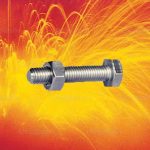 Also known as Alloy 660, A286 bolts are a cost-effective material for high temperature strength – see why in this snapshot newsletter. What specifications can you offer? A286 is available in ASTM and many AMS standards (often required for aerospace applications) including: ASTM A453, AMS 5525, AMS 5726, AMS 5732, AMS 5737, AMS 5804. What … Continue reading
Also known as Alloy 660, A286 bolts are a cost-effective material for high temperature strength – see why in this snapshot newsletter. What specifications can you offer? A286 is available in ASTM and many AMS standards (often required for aerospace applications) including: ASTM A453, AMS 5525, AMS 5726, AMS 5732, AMS 5737, AMS 5804. What … Continue reading - Differentiating Nickel Alloys: Monel, Hastelloy & Inconel? -
 Nickel alloys are known for their corrosion resistance, but each material has its own special focus. This newsletter gives a quick summary of the top grades. Monel: Saltwater…And Strength For years, Monel bolts have been the go-to material for saltwater resistance by the military. … Continue reading
Nickel alloys are known for their corrosion resistance, but each material has its own special focus. This newsletter gives a quick summary of the top grades. Monel: Saltwater…And Strength For years, Monel bolts have been the go-to material for saltwater resistance by the military. … Continue reading - Sulfuric Acid: Which Fastener Material is Best? -
 Sulfuric Acid ( H2SO4 ) is one of the most widely used and important acids, being an essential component to many industries. Equally as important is selecting the right material to survive this environment. This newsletter will provide options. WHICH IS BEST? That depends on BOTH concentration and temperature – … Continue reading
Sulfuric Acid ( H2SO4 ) is one of the most widely used and important acids, being an essential component to many industries. Equally as important is selecting the right material to survive this environment. This newsletter will provide options. WHICH IS BEST? That depends on BOTH concentration and temperature – … Continue reading - Material Focus: 17-4 Bolts for Extreme Strength - High strength bolts are one of the main reasons engineers look to specialty materials. 17-4PH bolts often fulfill this demand. In this short newsletter we hope to answer many of your questions surrounding the age-hardened stainless steel we call 17-4PH How much strength can 17-4PH provide? 17-4PH bolts can provide … Continue reading
- Polymers at Cryogenic Temperatures -
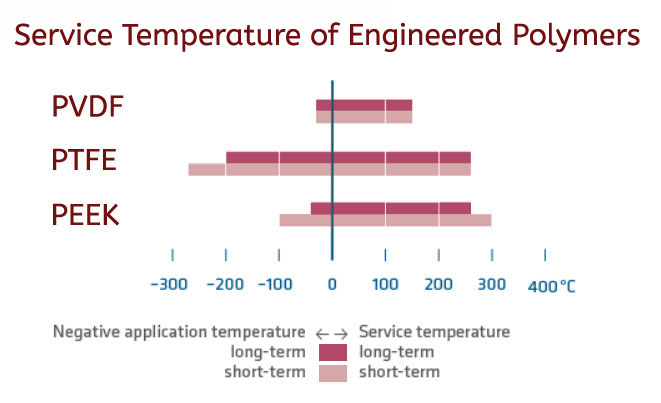 Polymers at Cryogenic Temperatures Most often people want to know how hot a material can be used up to in an application, however for cryogenic applications, in media like liquified gasses (nitrogen, oxygen, carbon dioxide, LNG, etc.), we need to understand how materials perform at very cold temperatures. Polymer fasteners … Continue reading
Polymers at Cryogenic Temperatures Most often people want to know how hot a material can be used up to in an application, however for cryogenic applications, in media like liquified gasses (nitrogen, oxygen, carbon dioxide, LNG, etc.), we need to understand how materials perform at very cold temperatures. Polymer fasteners … Continue reading - How does 316 Stainless Compares to Specialty Steel Alloys -
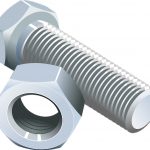 316 stainless is a familiar alloy to many of us and perhaps one of the most widely used fastening materials. Though it serves a critical function for industry, 316 can often fall short in servicing challenging high strength, temperature and corrosion resistant applications. Here is how it measures up in … Continue reading
316 stainless is a familiar alloy to many of us and perhaps one of the most widely used fastening materials. Though it serves a critical function for industry, 316 can often fall short in servicing challenging high strength, temperature and corrosion resistant applications. Here is how it measures up in … Continue reading - Making the Right Choice: Inconel 600, 601, 625 & 718 -
 Inconel bolts are a nickel alloy fastener that are known for their use in high temperature applications that also require high strength. Many grades are also used for their excellent level of corrosion resistance in harsh chemical environments. This brief newsletter highlights the unique attributes of each Inconel bolt … Continue reading
Inconel bolts are a nickel alloy fastener that are known for their use in high temperature applications that also require high strength. Many grades are also used for their excellent level of corrosion resistance in harsh chemical environments. This brief newsletter highlights the unique attributes of each Inconel bolt … Continue reading - Choosing a Non-Magnetic Fastener -
 Non-magnetic fasteners service a variety of applications mainly where magnetic “interference” needs to be avoided. Cryogenic and medical applications such as MRI’s are just a few of the key places non-magnetic fasteners are needed. This newsletter highlights a few specialty metal fasteners that can service non-magnetic needs. Inconel Bolts Non-magnetic … Continue reading
Non-magnetic fasteners service a variety of applications mainly where magnetic “interference” needs to be avoided. Cryogenic and medical applications such as MRI’s are just a few of the key places non-magnetic fasteners are needed. This newsletter highlights a few specialty metal fasteners that can service non-magnetic needs. Inconel Bolts Non-magnetic … Continue reading - Rolled vs Cut Threads -
 Fasteners threads are made by one of two processes. Rolling the threads of the bolt or cutting them. This newsletter will describe each process, as well as the advantages and disadvantages. Rolled Threads This type of thread is made by a forming process where threads are created as the fastener … Continue reading
Fasteners threads are made by one of two processes. Rolling the threads of the bolt or cutting them. This newsletter will describe each process, as well as the advantages and disadvantages. Rolled Threads This type of thread is made by a forming process where threads are created as the fastener … Continue reading - Solving The Cold Hard Truth of Cryogenic Gasket Failures -
 Cryogenic service can be harsh on any equipment, but gaskets have their own specific challenges. Due to the expansion and contraction when temperatures fluctuate between room and cryogenic, gasket sealing mechanisms can be compromised. This newsletter provides answers to issues facing gaskets in cryogenic service. How do cryogenic temps affect … Continue reading
Cryogenic service can be harsh on any equipment, but gaskets have their own specific challenges. Due to the expansion and contraction when temperatures fluctuate between room and cryogenic, gasket sealing mechanisms can be compromised. This newsletter provides answers to issues facing gaskets in cryogenic service. How do cryogenic temps affect … Continue reading - When to Choose Duplex Steel Bolts vs 316 Stainless -
 Duplex Steel: Strength & Corrosion Resistance Beyond 316 316 Stainless steel fasteners have many applications, but if you are looking for an all-around improved fastener without breaking the budget, Duplex alloys might be a good choice. Duplex steel fasteners are known for their improved strength (being about 2x stronger) and … Continue reading
Duplex Steel: Strength & Corrosion Resistance Beyond 316 316 Stainless steel fasteners have many applications, but if you are looking for an all-around improved fastener without breaking the budget, Duplex alloys might be a good choice. Duplex steel fasteners are known for their improved strength (being about 2x stronger) and … Continue reading - Fasteners That Keep Us Safe - Modern day engineering is key to helping the world through this difficult time, and specialty material bolts make it possible. Materials like titanium, PEEK and 17-4PH provide the corrosion resistance and high strength needed for manufacturing and high-tech distribution. This newsletter shows some of the ways Extreme Bolt & Fastener … Continue reading
- Choosing the Right Material for Chloride Corrosion - Fasteners for CHLORIDE CORROSION Fighting chloride corrosion is one of the most common issues that face industrial processes. From industrial process in water treatment to pulp & paper as well as seawater applications, chlorides are very common and menace to industry. This brief newsletter shares insight into which materials for … Continue reading
- Which Polymer Is Right for You? -
 PEEK, PVDF and PTFE all offer lightweight, electrical & thermal insulation and great corrosion resistance. But when it comes to strength, temperature, purity and corrosion, each has its niche. The newsletter points out which is best to use in different conditions. TEMPERATURE PEEK and PTFE screws offer excellent high temperature … Continue reading
PEEK, PVDF and PTFE all offer lightweight, electrical & thermal insulation and great corrosion resistance. But when it comes to strength, temperature, purity and corrosion, each has its niche. The newsletter points out which is best to use in different conditions. TEMPERATURE PEEK and PTFE screws offer excellent high temperature … Continue reading - Choosing a Refractory Metal Fastener -
 What is a refractory metal fastener? Molybdenum, tantalum, tungsten and zirconium are all refractory metals. (We are excluding titanium from this topic although it can be considered a refractory metal by certain definitions). All these refractory metal fasteners are characterized by their high-temperature melting points, but they also have other … Continue reading
What is a refractory metal fastener? Molybdenum, tantalum, tungsten and zirconium are all refractory metals. (We are excluding titanium from this topic although it can be considered a refractory metal by certain definitions). All these refractory metal fasteners are characterized by their high-temperature melting points, but they also have other … Continue reading - Do’s and Don’ts of Titanium Fasteners -
 Titanium is an amazing material offering strength, lightness of weight, and corrosion resistance but there are also instances that titanium should not be used. This brief newsletter covers the do’s and don’ts of titanium screws. Do Use for Saltwater & Chloride Resistance One of the most noteworthy uses of titanium … Continue reading
Titanium is an amazing material offering strength, lightness of weight, and corrosion resistance but there are also instances that titanium should not be used. This brief newsletter covers the do’s and don’ts of titanium screws. Do Use for Saltwater & Chloride Resistance One of the most noteworthy uses of titanium … Continue reading - Comparison of Salt Water Resistant Fasteners – Which is Best? -
 Salt water is great for swimming, but provides industry a wide range of corrosion challenges from marine vessels to desalination plants, and even off-shore oil. The good news is there are several materials that perform very well in these environments. This newsletter compares them on their salt water corrosion resistance … Continue reading
Salt water is great for swimming, but provides industry a wide range of corrosion challenges from marine vessels to desalination plants, and even off-shore oil. The good news is there are several materials that perform very well in these environments. This newsletter compares them on their salt water corrosion resistance … Continue reading - Overview of Extreme High Strength Fasteners -
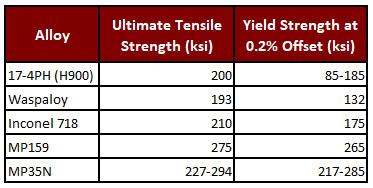 Extreme high strength fasteners made from advanced alloys allow industries such as aerospace, mining, and oil & gas to push the limits of what is possible. With requirements of ultimate tensile strengths beyond 200ksi this newsletter reviews these materials, their specific traits and niches. 17-4 PH Age hardened, 17-4PH … Continue reading
Extreme high strength fasteners made from advanced alloys allow industries such as aerospace, mining, and oil & gas to push the limits of what is possible. With requirements of ultimate tensile strengths beyond 200ksi this newsletter reviews these materials, their specific traits and niches. 17-4 PH Age hardened, 17-4PH … Continue reading - How to Choose High Temp Oxidation Resistant Fasteners -
 From thermal processing and furnace applications to the extreme demands of aerospace, several high temperature alloys are available each with unique traits and capabilities. This brief newsletter will outline the primary fastener materials that are commonly used for excellent high temperature and oxidation resistance. Best High Temperature Oxidation Resistant Fasteners … Continue reading
From thermal processing and furnace applications to the extreme demands of aerospace, several high temperature alloys are available each with unique traits and capabilities. This brief newsletter will outline the primary fastener materials that are commonly used for excellent high temperature and oxidation resistance. Best High Temperature Oxidation Resistant Fasteners … Continue reading - Nickel Alloys Part 1: Moderate Corrosion -
 Nickel alloys are a special class of metals containing high levels of nickel (often greater than 20%). They play a key role in industry for their unique combination of high strength, corrosion resistance to harsh acids (like hydrochloric and sulfuric) and high temperature stability. This two-part newsletter will help summarize the distinct benefits of the … Continue reading
Nickel alloys are a special class of metals containing high levels of nickel (often greater than 20%). They play a key role in industry for their unique combination of high strength, corrosion resistance to harsh acids (like hydrochloric and sulfuric) and high temperature stability. This two-part newsletter will help summarize the distinct benefits of the … Continue reading - Hastelloy and Incoloy: Fasteners for Oil Field Corrosion -
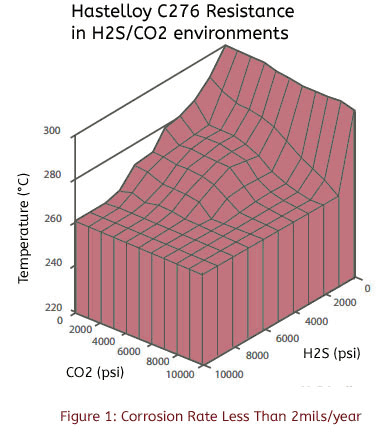 Oilfields are subjected to a diversity of corrosive elements including carbonic acids, sour gas (H2S), and fracking/stimulant acids such as hydrochloric and hydrofluoric acid. Naphthenic acids and simple organic acids are also found in crude oil extraction. In conjunction to acids, these environments contain sand and other abrasive elements which … Continue reading
Oilfields are subjected to a diversity of corrosive elements including carbonic acids, sour gas (H2S), and fracking/stimulant acids such as hydrochloric and hydrofluoric acid. Naphthenic acids and simple organic acids are also found in crude oil extraction. In conjunction to acids, these environments contain sand and other abrasive elements which … Continue reading - Choosing a Specialty Material Hose Clamp -
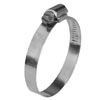 Extreme bolt offers hose clamps in Titanium and Hastelloy C276. This newsletter overviews the two styles available – worm drive and medium duty – as well as highlight what materials are best for your application. Titanium Grade 2 hose clamps are in stock and available in the sizes shown here. Hastelloy C276 hose clamps are custom made to order … Continue reading
Extreme bolt offers hose clamps in Titanium and Hastelloy C276. This newsletter overviews the two styles available – worm drive and medium duty – as well as highlight what materials are best for your application. Titanium Grade 2 hose clamps are in stock and available in the sizes shown here. Hastelloy C276 hose clamps are custom made to order … Continue reading - Most Common of Hastelloy Fasteners Reviewed -
 Hastelloy alloys have long been the gold standard of corrosion resistant bolts; only out performed by metals like Zirconium and Tantalum. This family of high performance nickel alloys can handle strong acids like hydrochloric, sulfuric, acetic, formic and phosphoric acids, yet each grade actually exhibits its own strengths in dealing with specific acids and niche environments. … Continue reading
Hastelloy alloys have long been the gold standard of corrosion resistant bolts; only out performed by metals like Zirconium and Tantalum. This family of high performance nickel alloys can handle strong acids like hydrochloric, sulfuric, acetic, formic and phosphoric acids, yet each grade actually exhibits its own strengths in dealing with specific acids and niche environments. … Continue reading - AL6XN vs Alloy 20 Fasteners: What’s the difference? Which is best? - These two alloys are often confused as being almost the same, which is almost true. They are both nickel alloys and share many key characteristics. AL6XN and Alloy 20 are alike in that they each retain their strength to about 1000°F. In addition they both perform well, in salt water environments, … Continue reading
- Inconel bolts vs. Monel bolts. What’s the difference? Which is better? -
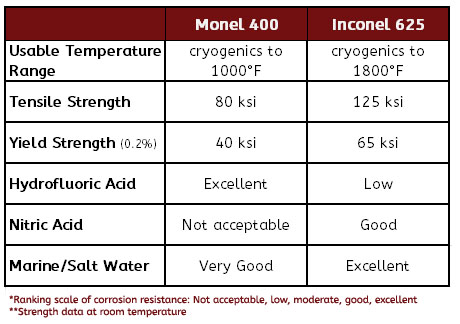 They rhyme, are both used in extreme environments, and are both nickel metal alloys, but Monel and Inconel are actually very different. But how? Let’s start with basic chemistry. Monel is a nickel-copper alloy and Inconel is a nickel-chromium alloy. So what does that mean for your extreme application? We … Continue reading
They rhyme, are both used in extreme environments, and are both nickel metal alloys, but Monel and Inconel are actually very different. But how? Let’s start with basic chemistry. Monel is a nickel-copper alloy and Inconel is a nickel-chromium alloy. So what does that mean for your extreme application? We … Continue reading - Fastener Thread Galling: What Is It & How to Prevent It? -
 Thread galling is a common yet a seldom understood fastener problem seen by engineers and fabricators. It occurs when pressure and friction cause bolt threads to seize to the threads of a nut or tapped hole. The fasteners are not just overly tight but “cold/contact” welded together.
Thread galling is a common yet a seldom understood fastener problem seen by engineers and fabricators. It occurs when pressure and friction cause bolt threads to seize to the threads of a nut or tapped hole. The fasteners are not just overly tight but “cold/contact” welded together. - Inconel 625 vs. 718 bolts: Which Is Best for Your Application? - Inconel fasteners are commonly used for extreme environments and come in various “flavors” depending on the needs of the application. This brief paper will give you a quick comparison of the two most popular grades, Inconel 625 and Inconel 718 to help you choose the best material.
- Know Your Lock Nuts -
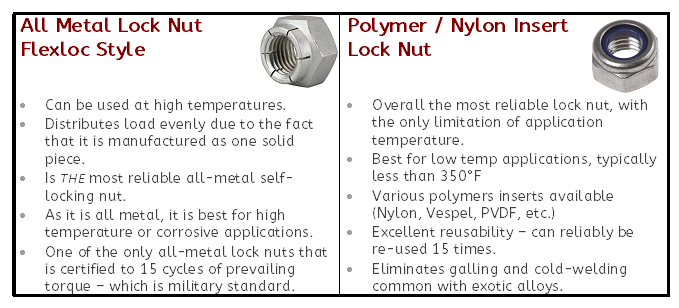 A lock nut resists loosening from vibrations and torque. Specialty material lock nuts offer the ideal solution to many extreme applications environments. They combine the unique properties of specialty materials, with the secure locking feature of a lock nut to prevent failures in the field.
A lock nut resists loosening from vibrations and torque. Specialty material lock nuts offer the ideal solution to many extreme applications environments. They combine the unique properties of specialty materials, with the secure locking feature of a lock nut to prevent failures in the field. - The Specialty Material Fasteners of a Star Wars X-Wing Fighter - NASA has been designing rockets and manned space ships for over 50 years, but nothing like the innovation needed to build a light-speed, fighter spacecraft. At Extreme Bolt, we supply the aviation industry with a diversity of fasteners made from extreme materials. Though Star Wars is a fictitious story, it … Continue reading
- Fasteners for Vacuum Furnaces: What Material Is Best? - Vacuum furnaces offer engineers a unique processing environment: high temperatures, controlled atmospheres, and rapid cooling. This low contamination environment is perfect for brazing, sintering, and heat treatment. Due to the constant extreme temperatures (typically 1,100–1,500°C), choosing the right fastener material can be a challenge. This brief paper will give you an overview on what high … Continue reading
- Precipitation Hardened Bolts: The What & Why? - So you’ve heard the term, but what is it? Technically, it is a method in which an alloy’s structural matrix is altered on an atomic level by using temperature change to enhance the material’s mechanical properties – increasing the yield and tensile strength. Simply, it is a way to further strengthen a material. It is … Continue reading
- Fastener Torque Part 2 – How To REALLY Measure Tension -
 Tension, Not Torque Matters: How to Measure Bolt Tension In our last post, we discussed how measuring torque is an inaccurate way of getting the right bolt tension. In fact, a brand new bolt will require +/-40% torque to achieve the same tension as another new bolt out of the … Continue reading
Tension, Not Torque Matters: How to Measure Bolt Tension In our last post, we discussed how measuring torque is an inaccurate way of getting the right bolt tension. In fact, a brand new bolt will require +/-40% torque to achieve the same tension as another new bolt out of the … Continue reading - Fastener Torque Part 1 – The False Truth: It’s Really Tension that Matters - (Stay tuned next week for Part 2 – How to Measure Tension) Everyone is always concerned about getting the right torque. Regularly, customers contact us requesting material torque charts. Everyone is so concerned about what they are setting their torque wrench to, that they are missing what matters most: getting the right … Continue reading
- Sea Water Corrosion: Monel, AL-6XN & Titanium to the Rescue - With over 30% of marine equipment failures being the result of marine corrosion, the subsequent costs have added up; now seawater corrosion costs are estimated at 4 % of the GNP. Unfortunately, sea water is not a simple medium because it is chemically and biologically active, which can have an … Continue reading
- Fasteners For Hydrochloric Acid (HCl) -
 While hydrochloric acid (HCl) is a common and critical industrial chemical, it often causes significant maintenance issues for fasteners. Due to elevated temperatures, fluctuating concentrations and permeation of its vapors, utilizing the correct material for your fasteners is key to withstanding this potent acid. This article will briefly review some … Continue reading
While hydrochloric acid (HCl) is a common and critical industrial chemical, it often causes significant maintenance issues for fasteners. Due to elevated temperatures, fluctuating concentrations and permeation of its vapors, utilizing the correct material for your fasteners is key to withstanding this potent acid. This article will briefly review some … Continue reading - Specialty Stainless Steel Fasteners: A-286, Super Dupex & 17-4PH -
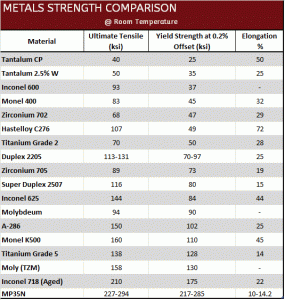 While there are many grades of stainless steel available for fasteners, we will focus on three of the highest performing grades used: Super Duplex, A-286 and 17-4PH.When comparing these materials to 316 stainless steel, their properties – of corrosion resistance, strength and high temperature stability – are significantly improved.
While there are many grades of stainless steel available for fasteners, we will focus on three of the highest performing grades used: Super Duplex, A-286 and 17-4PH.When comparing these materials to 316 stainless steel, their properties – of corrosion resistance, strength and high temperature stability – are significantly improved. - Fasteners for High Temperature Applications -
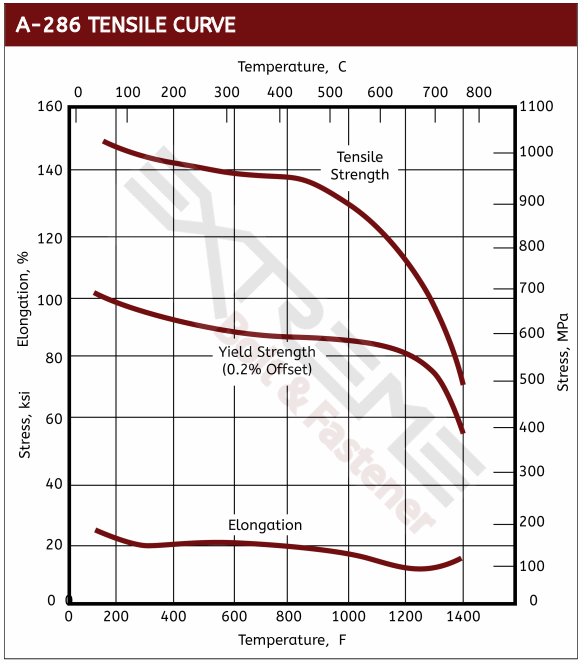 At elevated temperatures of beyond 1000°F, fasteners face a variety of complications which impact their performance. In this article, we will look at some common problems related to elevated temperatures and make recommendations of the best materials to address them.
At elevated temperatures of beyond 1000°F, fasteners face a variety of complications which impact their performance. In this article, we will look at some common problems related to elevated temperatures and make recommendations of the best materials to address them. - Fasteners for Sulfuric Acid (H2SO4) -
 Sulfuric Acid (H2SO4) is one of the most widely used and industrially important acids in modern society, being an essential component in the production of polymers, fuels, pharmaceuticals, electronics, and mining. While sulfuric acid is commonly used, enabling fasteners to survive in this environment is not always an easy task. To help you tackle this feat, … Continue reading
Sulfuric Acid (H2SO4) is one of the most widely used and industrially important acids in modern society, being an essential component in the production of polymers, fuels, pharmaceuticals, electronics, and mining. While sulfuric acid is commonly used, enabling fasteners to survive in this environment is not always an easy task. To help you tackle this feat, … Continue reading - Corrosion Resistant Titanium Fasteners – More Than Meets the Eye! - Titanium fasteners are well known for their amazing combination of high strength and lightness of weight, but a lesser known characteristic of titanium is its unique corrosion resistance.
- Fastener Ultimate Tensile Strength vs. Yield Strength: Which is More Important? -
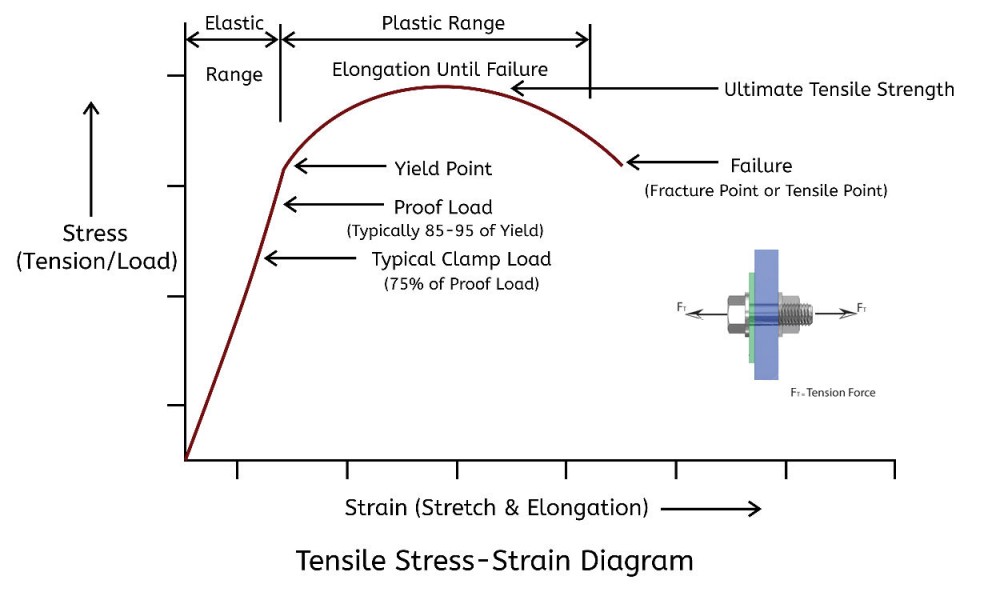 One of the most common questions we get at Extreme Bolt & Fastener is “Which material is stronger?” People instinctively would like to compare the tensile strengths of various specialty metal fasteners to get the strongest one for their application. While this may seem like a reasonable thing to do, … Continue reading
One of the most common questions we get at Extreme Bolt & Fastener is “Which material is stronger?” People instinctively would like to compare the tensile strengths of various specialty metal fasteners to get the strongest one for their application. While this may seem like a reasonable thing to do, … Continue reading - Titanium Fasteners – Selecting the Best Grade for Your Tough Application - All titanium grades are not created equal…And with over 40 grades of titanium alloys available, it may be a bit overwhelming to choose the best titanium grade for your unique and challenging application. But don’t worry, we are here to help…
- Corrosion Resistant Polymer Fasteners Demystified -
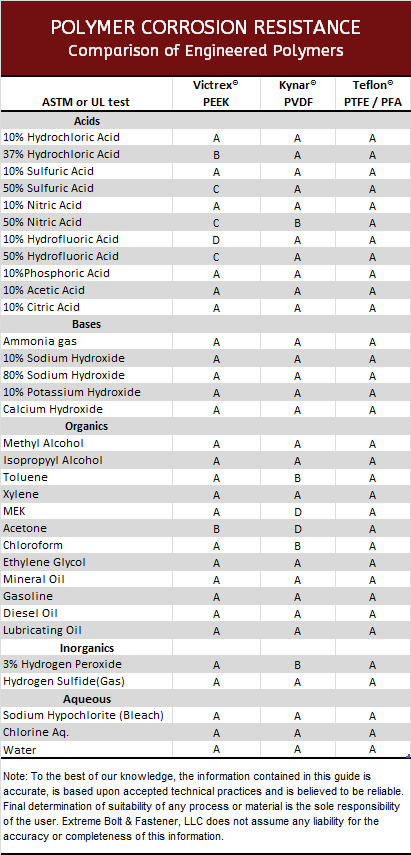 Choosing the right specialty polymer fastener for your corrosive application can be a confusing task. There are numerous material options, puzzling polymer acronyms and generally too much information. However, understanding the general chemical resistance of polymers will put you in a better position to make the best choice for your … Continue reading
Choosing the right specialty polymer fastener for your corrosive application can be a confusing task. There are numerous material options, puzzling polymer acronyms and generally too much information. However, understanding the general chemical resistance of polymers will put you in a better position to make the best choice for your … Continue reading
Sie sind sich nicht sicher, welches Material für Ihre Anwendung am besten geeignet ist?
Kontaktieren Sie einen Experten
Suche nach Material
Suche nach Anwendung

 Oilfields are subjected to a diversity of corrosive elements including carbonic acids, sour gas (H2S), and fracking/stimulant acids such as hydrochloric and hydrofluoric acid. Naphthenic acids and simple organic acids are also found in crude oil extraction. In conjunction to acids, these environments contain sand and other abrasive elements which …
Oilfields are subjected to a diversity of corrosive elements including carbonic acids, sour gas (H2S), and fracking/stimulant acids such as hydrochloric and hydrofluoric acid. Naphthenic acids and simple organic acids are also found in crude oil extraction. In conjunction to acids, these environments contain sand and other abrasive elements which …  Extreme bolt offers hose clamps in Titanium and Hastelloy C276. This newsletter overviews the two styles available – worm drive and medium duty – as well as highlight what materials are best for your application. Titanium Grade 2 hose clamps are in stock and available in the sizes shown here. Hastelloy C276 hose clamps are custom made to order …
Extreme bolt offers hose clamps in Titanium and Hastelloy C276. This newsletter overviews the two styles available – worm drive and medium duty – as well as highlight what materials are best for your application. Titanium Grade 2 hose clamps are in stock and available in the sizes shown here. Hastelloy C276 hose clamps are custom made to order …  Hastelloy alloys have long been the gold standard of corrosion resistant bolts; only out performed by metals like Zirconium and Tantalum. This family of high performance nickel alloys can handle strong acids like hydrochloric, sulfuric, acetic, formic and phosphoric acids, yet each grade actually exhibits its own strengths in dealing with specific acids and niche environments. …
Hastelloy alloys have long been the gold standard of corrosion resistant bolts; only out performed by metals like Zirconium and Tantalum. This family of high performance nickel alloys can handle strong acids like hydrochloric, sulfuric, acetic, formic and phosphoric acids, yet each grade actually exhibits its own strengths in dealing with specific acids and niche environments. …  They rhyme, are both used in extreme environments, and are both nickel metal alloys, but Monel and Inconel are actually very different. But how? Let’s start with basic chemistry. Monel is a nickel-copper alloy and Inconel is a nickel-chromium alloy. So what does that mean for your extreme application? We …
They rhyme, are both used in extreme environments, and are both nickel metal alloys, but Monel and Inconel are actually very different. But how? Let’s start with basic chemistry. Monel is a nickel-copper alloy and Inconel is a nickel-chromium alloy. So what does that mean for your extreme application? We …  A lock nut resists loosening from vibrations and torque. Specialty material lock nuts offer the ideal solution to many extreme applications environments. They combine the unique properties of specialty materials, with the secure locking feature of a lock nut to prevent failures in the field.
A lock nut resists loosening from vibrations and torque. Specialty material lock nuts offer the ideal solution to many extreme applications environments. They combine the unique properties of specialty materials, with the secure locking feature of a lock nut to prevent failures in the field. While there are many grades of stainless steel available for fasteners, we will focus on three of the highest performing grades used: Super Duplex, A-286 and 17-4PH.When comparing these materials to 316 stainless steel, their properties – of corrosion resistance, strength and high temperature stability – are significantly improved.
While there are many grades of stainless steel available for fasteners, we will focus on three of the highest performing grades used: Super Duplex, A-286 and 17-4PH.When comparing these materials to 316 stainless steel, their properties – of corrosion resistance, strength and high temperature stability – are significantly improved. At elevated temperatures of beyond 1000°F, fasteners face a variety of complications which impact their performance. In this article, we will look at some common problems related to elevated temperatures and make recommendations of the best materials to address them.
At elevated temperatures of beyond 1000°F, fasteners face a variety of complications which impact their performance. In this article, we will look at some common problems related to elevated temperatures and make recommendations of the best materials to address them.